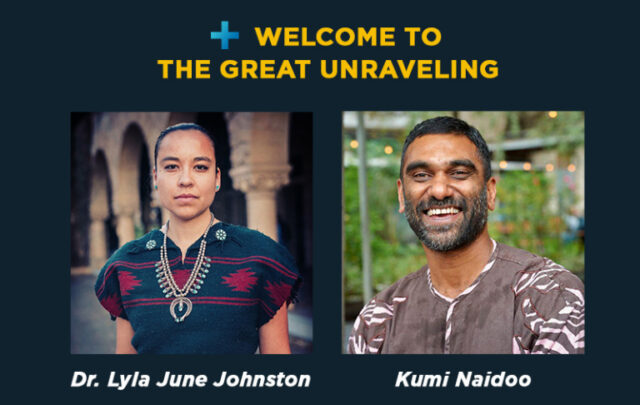Click on the headline (link) for the full text.
Many more articles are available through the Energy Bulletin homepage.
Why Bolivia Stood Alone in Opposing the Cancún Climate Agreement
Pablo Solon, Guardian/UK
Diplomacy is traditionally a game of alliance and compromise. Yet in the early hours of Saturday 11 December, Bolivia found itself alone against the world: the only nation to oppose the outcome of the United Nations climate change summit in Cancún. We were accused of being obstructionist, obstinate and unrealistic. Yet in truth we did not feel alone, nor are we offended by the attacks. Instead, we feel an enormous obligation to set aside diplomacy and tell the truth.
The “Cancún accord” was presented late Friday afternoon, and we were given two hours to read it. Despite pressure to sign something – anything – immediately, Bolivia requested further deliberations. This text, we said, would be a sad conclusion to the negotiations. After we were denied any opportunity to discuss the text, despite a lack of consensus, the president banged her gavel to approve the document.
Many commentators have called the Cancún accord a “step in the right direction.” We disagree: it is a giant step backward. The text replaces binding mechanisms for reducing greenhouse gas emissions with voluntary pledges that are wholly insufficient.
… Bolivia is a small country. This means we are among the nations most vulnerable to climate change, but with the least responsibility for causing the problem. Studies indicate that our capital city of La Paz could become a desert within 30 years. What we do have is the privilege of being able to stand by our ideals, of not letting partisan agendas obscure our principal aim: defending life and Earth. We are not desperate for money. Last year, after we rejected the Copenhagen accord, the US cut our climate funding. We are not beholden to the World Bank, as so many of us in the south once were. We can act freely and do what is right.
Bolivia may have acted unusually by upsetting the established way of dealing with things. But we face an unprecedented crisis, and false victories won’t save the planet. False agreements will not guarantee a future for our children. We all must stand up and demand a climate agreement strong enough to match the crisis we confront.
Pablo Solon is the ambassador of the Plurinational State of Bolivia to the United Nations.
(22 December 2010)
Is the Wikileaks Saga the Biggest Crypto-Environmental Story of 2010?
Matthew McDermott, TreeHugger
… as the saga of Julian Assange and Wikileaks continues, I increasingly think that this may well turn out to be the biggest environmental story of the year and next.
The environmentally-related cables released so far haven’t been entirely revelatory–though the Dalai Lama commenting that environmental issues in Tibet need to take precedence over political ones for a while was unexpected–but the reaction of politicians in the US and abroad, across the mainstream political spectrum, as well as much of the mainstream media, says more about the challenge we collectively face in creating a more socioecologically sustainable future than any of the overtly environmental events of 2010.
If a crucial part of creating that future is bringing greater transparency and greater democracy to all of our business and political dealings, then credit card companies and banks cutting off service to Wikileaks, calls for assassination of Julian Assange even by so-called liberal politicians, Orwellian directives from government offices that unauthorized employees shouldn’t view classified cables even though they are de facto now in the public domain, all indicate that the road ahead is longer and more difficult than we’d like to think.
Corporate and political transparency, corporate and political responsiveness to the needs of communities are all key to dealing effectively with the myriad bigger-than-self environmental issues looming on the horizon.
(21 December 2010)
Thinking Dialectically About Solidarity
Grace Lee Boggs, CommonDreams.org
… For most of the 20th century, Solidarity has meant “Workers of the World Unite” and/or “the union makes us strong.”
But in the age of corporate globalization and the outsourcing and downsizing of jobs, Solidarity is beginning to mean connecting grassroots communities who are resisting corporate devastation and displacement by creating ways of living that give us control over our lives.
The emergence of the Zapatistas in 1994 at Chiapas in response to NAFTA (North American Free Trade Agreement) was the first announcement to the world that grassroots people are creating new self- healing civic groups in response to corporate globalization.
A decade later, according to one estimate by Paul Hawken in Blessed Unrest, there may be as many as half a million of these groups, most of them small and barely visible in every country around the world.
In two widely-read books, Empire (2000) and Multitude (2004), political theorists Michael Hardt and Antonio Negri emphasize the singularity or diversity of these groups. They do not fuse into some unity like “the people” or the “workers of the world.” Nor are they connected in centralized organizations like the 2nd or 3rd Internationals, as in the Marxist-Leninist era. What they have in common is that they are each imagining and creating the new social identities, the new political subjects that will take the place of the cogs and consumers to which global capitalism seeks to reduce us.
These self-healing civic groups and communities connect mainly through networks.
Grace Lee Boggs has been an activist for more than 60 years and is the author of the autobiography Living for Change.
(20 December 2010)
How nonprofit journalism is changing the ‘news ecosystem’
Robert McClure, Open Channel, MSNBC
This guest commentary was written by Robert McClure, whose stories on the dangers of rat poison in the environment are being published Tuesday and Wednesday on msnbc.com:
—
Today’s msnbc.com story on how a super-toxic second generation of rat poisons is mysteriously seeping into the environment might have remained a buried and unnoticed piece of history if not for a new movement sweeping America: nonprofit journalism. It’s an important force that is likely to become a key part of what folks are calling an evolving “news ecosystem” in this country. Today’s pairing of the efforts of two nonprofit journalism entities with the for-profit msnbc.com is an example of the kind of experimentation that’s becoming common.
I wrote the rat-poisons story for InvestigateWest, a nonprofit investigative journalism center focused on the Pacific Northwest and British Columbia that I helped to found in 2009.
… Both entities are part of a new wave of journalism born of the chaotic decline we’ve seen in our nation’s newspapers and broadcast newsrooms. Nonprofit journalism centers are popping up all over the place. One of the best-known is ProPublica, which has its newsroom in a New York City office building, employs more than 30 top-notch journalists and enjoys substantial funding from large foundations.
More common are smaller groups such as InvestigateWest. We have three full-time staffers and a modest office in Seattle. Our financial support comes from small and medium-sized foundations. Importantly, we are also beginning to gather support from a growing number of individuals who want to see in-depth journalism survive the business-model crisis that saw American newspapers shed more than 35,000 jobs since 2007. We are helping take up the slack, and we aim to do more.
… About 50 nonprofit journalism centers have banded together into the Investigative News Network. Together we are trying to eke out a living while figuring out how to recreate a business model that supports the journalism that is oxygen to our democracy. That’s really what it’s all about: preserving editorial voices that can inform Americans and keep the powers-that-be honest. On InvestigateWest’s office wall we have a bumper sticker: “Democracy depends on journalism.” And our motto is: “Journalism for the common good.”
That’s really what this new nonprofit journalism is all about: preserving and modernizing the system that has allowed journalists to shine a light into dark corners that many in government and private industry would rather keep hidden.
(20 December 2010)
Monitoring America: Your Local Neighborhood’s ‘Global War on Terror’
Dana Priest and William M. Arkin, The Washington Post
Nine years after the terrorist attacks of 2001, the United States is assembling a vast domestic intelligence apparatus to collect information about Americans, using the FBI, local police, state homeland security offices and military criminal investigators.
[A localized intelligence apparatus is part of a larger Top Secret America created since the attacks. In July, The Washington Post described an alternative geography of the United States, one that has grown so large, unwieldy and secretive that no one knows how much money it costs, how many people it employs or how many programs exist within it.]A localized intelligence apparatus is part of a larger Top Secret America created since the attacks. In July, The Washington Post described an alternative geography of the United States, one that has grown so large, unwieldy and secretive that no one knows how much money it costs, how many people it employs or how many programs exist within it.
The system, by far the largest and most technologically sophisticated in the nation’s history, collects, stores and analyzes information about thousands of U.S. citizens and residents, many of whom have not been accused of any wrongdoing.
The government’s goal is to have every state and local law enforcement agency in the country feed information to Washington to buttress the work of the FBI, which is in charge of terrorism investigations in the United States.
Other democracies – Britain and Israel, to name two – are well acquainted with such domestic security measures. But for the United States, the sum of these new activities represents a new level of governmental scrutiny.
This localized intelligence apparatus is part of a larger Top Secret America created since the attacks. In July, The Washington Post described an alternative geography of the United States, one that has grown so large, unwieldy and secretive that no one knows how much money it costs, how many people it employs or how many programs exist within it.
Today’s story, along with related material on The Post’s Web site, examines how Top Secret America plays out at the local level. It describes a web of 4,058 federal, state and local organizations, each with its own counterterrorism responsibilities and jurisdictions. At least 935 of these organizations have been created since the 2001 attacks or became involved in counterterrorism for the first time after 9/11.
The months-long investigation, based on nearly 100 interviews and 1,000 documents, found that:
* Technologies and techniques honed for use on the battlefields of Iraq and Afghanistan have migrated into the hands of law enforcement agencies in America.
(20 December 2010)





